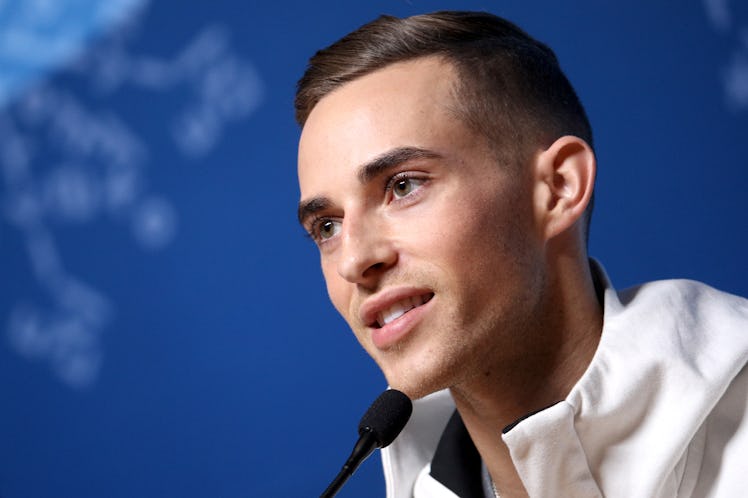
Adam Rippon Opened Up About His Body Image Issues In The Olympics & It's So Important
Conversations surrounding body image issues in athletes are generally geared toward women, but one Olympian is opening about up about his own struggles to shed light on something that isn't usually discussed. After sitting down for an interview with The New York Times, Adam Rippon’s quotes about body image issues in the Olympics are bringing awareness to the very serious reality of disordered eating habits in men, specifically male athletes. In a courageous move, Rippon has taken the first steps in starting a very important conversation.
Rippon's disordered eating started when he was just a 10-year-old boy, The New York Times reported, when his very first coach said he'd never become a figure skater because of his “heavy bottom.” For Olympic male athletes, in this case figure skaters specifically, the objective is to eat and train for a body that's both lean and strong to help them nail their complex jumps and spins, so having a "heavy bottom" could potentially affect an athlete's performance.
From then on, Rippon struggled with on and off body image issues for several years, but once he began working with Soviet Russian trainer Rafael Arutyunyan in 2012, Rippon's disordered eating took a turn for the worst.
Having gained a decent amount of muscle mass from years of extensive weight training, Rippon had naturally gained more weight by the time he and Arutyunan started training together, according to The New York Times. It was because of this that Arutyunyan focused his sessions on slimming down the Olympian-in-training with cardio drills on the elliptical. Arutyunan has since explained to The New York Times that, in the Soviet Union (where he comes from originally), he could be blunt, but in the United States, he quickly learned that making negative comments about an athlete's weight can be “kind of abusive,” and can even lead to his clients getting sick.
From there, Rippon’s perception of what was "healthy," and what the “right” body image is for his sport, were altered.
Rippon soon adopted a "draconian diet," in which he would only eat three pieces of bread per day.
If you're unfamiliar with the term, a "draconian diet" is a form of calorie restriction in which the person only eats four or five very small meals a day, usually consisting only of vegetables and fruit, and strongly lacks in essential nutrients. According to The New York Times, Rippon's version of the diet featured pieces of bread topped with thin layers of margarine, and three cups of coffee with six packets of artificial sweeteners as meal replacements in between bread slices. He told The New York Times,
I’d do a few days having my three pieces of bread and then finish the whole loaf of bread and have 3,000 calories. [I'd tell my coach,] "Rafael, this is what I’m eating." And he said, "I know. It’s really hard."
Because Rippon wasn't fueling his body with the proper vitamins and nutrients, his body became weak, leading to what he believed to be a stress fracture that caused his foot to break before nationals.
Doctors agree. "If we think about the body as an engine," Dr. Bakshi, Dr. Neeru Bakshi, medical director of the Eating Recovery Center in Washington, tells Elite Daily, "then we need to think about having enough fuel to have the engine run properly. For a high-achieving athlete [like Rippon], the fuel is even more important in regards to getting that Olympic-level excellence."
Rippon started working with United States Olympic Committee sports dietitian Susie Parker-Simmons to help him through his recovery. Her techniques, according to The New York Times, focus on changing struggling athletes' perspectives on food by encouraging them to literally plant seeds, eat what they grow, and think about their body composition in terms of genetics. After all, while your body is, in part, the way it is because of what you eat and how often you exercise, you also grow into yourself based on physical traits you develop from your parents, and that isn't always under your control. Food, however, is.
“These athletes are so disciplined,” Parker-Simmons told The New York Times, “and food is one of the things they can actually control when they can’t control other parts of their lives.”
Rippon's story is shedding light on an important conversation surrounding eating disorders in male athletes, and Twitter is so supportive.
Whether you're striving for an Olympic title or playing recreational sports, there are plenty of healthy ways to go about fueling your body.
Overall, the best way to take care of your body when you play an intensive sport is by fueling through proper nutrition, and by finding a healthy balance between work and rest. Dr. Bakshi says it might be helpful to meet with a registered dietitian who can give advice based on "the body's performance, and not just on weight."
Of course, it doesn't matter if you're a varsity athlete, or you're sitting in the bleachers, because Rippon's comments have resonated with both.
If you or someone you know is struggling with an eating disorder, it is always in your best interest to seek help. You can contact the Eating Recovery Center at eatingrecovery.com, or call 1-877-711-1690 to talk to a professional directly.